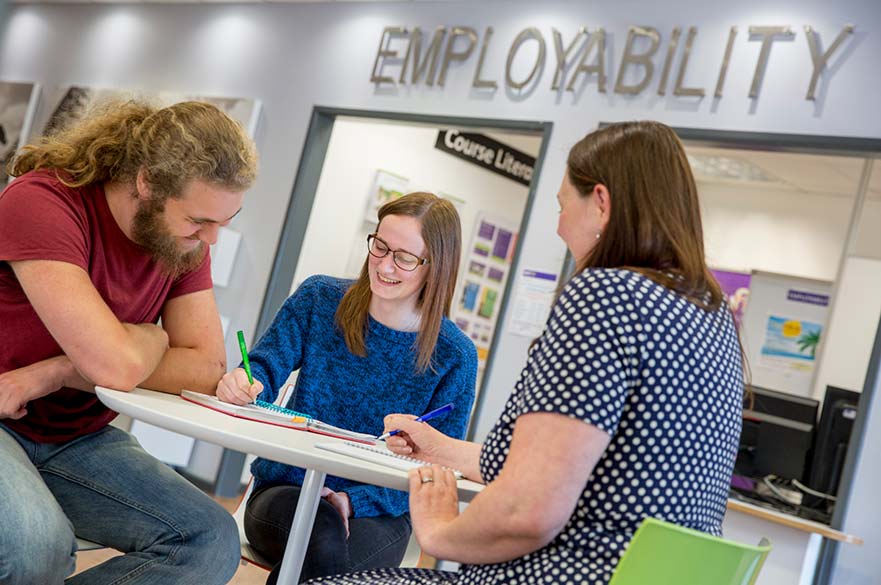Employability and careers
Through shaping our curriculum, and working with employers and our alumni we are embedding and enhancing employability in every Arts and Humanities degree in our school.
Why we're prioritising employability skills

It is our ambition to equip all students with the skills, qualities and experience to assist them to become work-ready. This helps our students enter a broad range of graduate level employment or to go onto beneficial further study.
We support all of our Arts and Humanities students in developing relevant professional attributes through a focus on employability that is embedded into the design, learning and assessment of every degree course in the school.
Every undergraduate student in our School will engage with 240 hours of work experience as part of their course. This includes core employability skills and career planning activity, assessed placement and work-like activity and coursework reflecting on their degree in the context of future career aspirations.
Placements
Work experience placements throughout the courses are an important element of our degree programmes and have been designed for mutual benefit. Our students share their time, skills, creative thinking and enthusiasm, and the placement organisation provides our students with real life, graduate-level work and learning experiences, often resulting in tried and tested talent for future graduate recruitment.
Placements are sourced and set up by our specialist employability staff. Some are also established by academics in the school based on their own professional contacts so they have the added value of being highly curriculum focused. Placements can also be self-sourced and students will be helped with this process by experienced and specialist staff if they choose this route.
Students are free to explore many different job roles for their work experience to dip their toe in the water, and to see what suits, including the following range of job titles:
- PR Assistant
- Events Manager
- Sub-Editor
- Assistant Archivist
- Digital Editor
- Curator and Museum Archivist
- Refugee Services Volunteer
- Social Media Manager
- Creative Writer
- Classroom Assistant
- Costume and Set Designer
- Paediatric Speech and Language Therapist
- Camera Operator
- Video and Podcast Producer
- Marketing and Communications Assistant.
Support is also given by module tutors to help students reflect on and contextualise their work experience and to articulate how it might influence future endeavours.
Curriculum
Elsewhere in the curriculum, employability is embedded in module content in imaginative ways. Groupwork on ‘live’ projects to briefs set by employers forms the assessed coursework for many modules.
This ranges from to arranging and running an academic conference on an English module, to the production of videos for local community groups on a Media module, to the research and production of a leaflet and exhibition on a local archive by a History student.
Employer links
Employer links are developed and nurtured in our school, with employers setting live briefs for assessed student projects and contributing to curriculum content through lectures and insights into their industry. Regular events link our students with potential employers including ‘Meet the Alumni’ events, a Futures Day focusing on journalism, media, PR and communications and a number of careers fairs throughout the year to facilitate placement and graduate recruitment.
Transition into work
Our support doesn’t end when you graduate. As an NTU student you will be entitled to dedicated graduate employability support for up to three years after you complete your studies. You’ll have access to exclusive events, initiatives and work experience opportunities to support you in the early stages of your graduate career.
Alumni Fellowships
The Alumni Fellowship Programme is NTU’s university-wide innovative alumni volunteering scheme, allowing valued graduates to give some of their time to support current students, and remain part of the NTU community. Fellows take part in activities such as one-to-one mentoring, guest lecturing, writing blog posts, employability workshops, offering placements, Q&A sessions, contributing to open days and much more.
In the School of Arts and Humanities, the programme is going from strength to strength with Alumni Fellows supporting the School. Fellows, who all have professional experience, draw expertise and knowledge from a wide range of career paths. Employers represented include Sky News, BBC Sport, the National Justice Museum, Boots UK, the National Trust, Tank PR, British Cycling, Canalside Heritage Centre, Coca-Cola, Google, Inclusivity Films, The British Library and many more, along with teachers, police officers, creative freelancers, writers and museum professionals. Learn more about the Alumni and Industry Fellowship Programme.
Find out more about employability services at NTU
Employability and careers
Employers look for more than a degree. Stand out from the crowd - our team are here to help you boost your CV and interview skills, and find work experience and jobs.
Alumni and Industry Fellowship Programme
Volunteer as part of our Alumni and Industry Fellowship Programme and make a difference to the lives of our students.